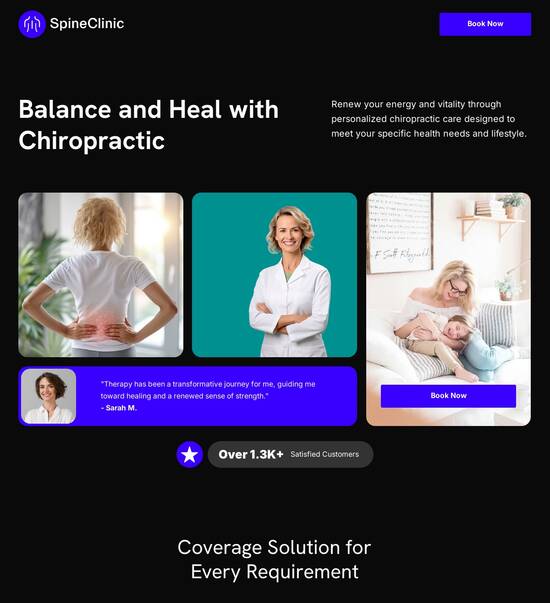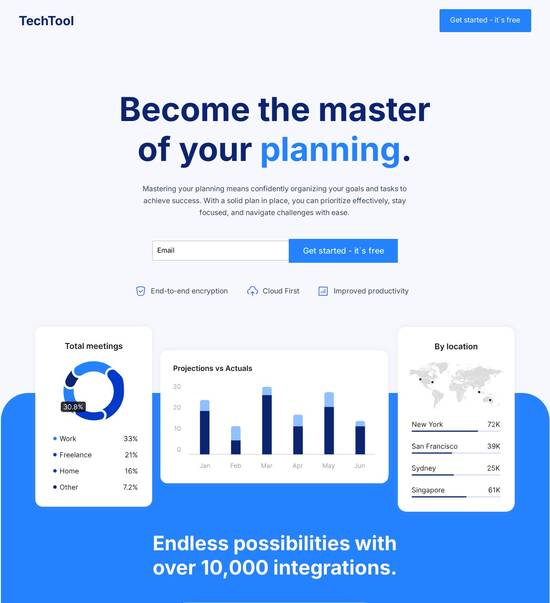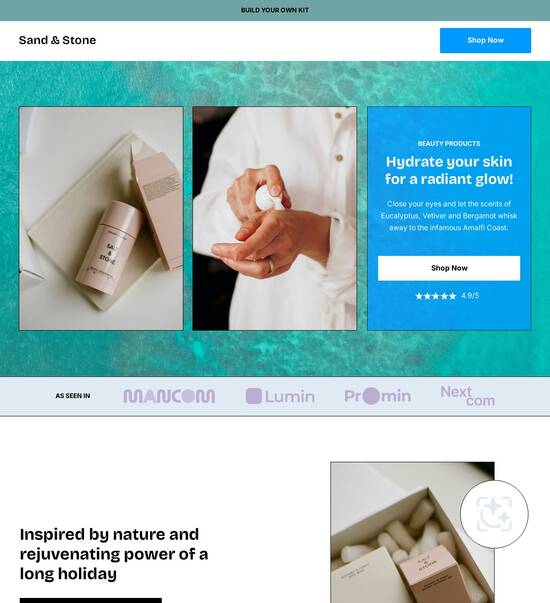
Onboarding page template for Content writers
Explore Similar TemplatesAbout template
Master your online marketing with this builder for onboarding page template for Content writers. Try more tools to create an immaculate landing page.
Recommended templates

Easy to build without coding
With the intuitive drag-and-drop builder, anyone on your team can create high-converting pages without any knowledge of code or design. Make enhancements to your landing page with custom widgets using Javascript, HTML/CSS, or third-party scripts.

Multiple layouts for any industry and goal
Select from 500+ landing page layouts built to boost conversions across industry-specific scenarios. Customize them by adjusting fonts, adding images, and generating on-brand content with the AI assistant. Quickly scale with Instablocks® and Global Blocks that you can save, reuse, and update globally.

Loads fast and looks polished on any device
Every template is responsive, which means they present professionally on any device and load blazingly fast with our Thor Render Engine. You can also power them up with Google AMP technology to deliver an unparalleled mobile experience and drive higher conversions.

Robust analytics & experimentation
Get real-time updates and reporting across all your devices, showing the number of visitors, conversions, cost-per-visitor, and cost-per-lead. Launch AI-powered experiments, run A/B tests, and use heatmaps to analyze user behavior, then optimize your landing page to maximize conversions.







Easy to build without coding
With the intuitive drag-and-drop builder, anyone on your team can create high-converting pages without any knowledge of code or design. Make enhancements to your landing page with custom widgets using Javascript, HTML/CSS, or third-party scripts.
Multiple layouts for any industry and goal
Select from 500+ landing page layouts built to boost conversions across industry-specific scenarios. Customize them by adjusting fonts, adding images, and generating on-brand content with the AI assistant. Quickly scale with Instablocks® and Global Blocks that you can save, reuse, and update globally.
Loads fast and looks polished on any device
Every template is responsive, which means they present professionally on any device and load blazingly fast with our Thor Render Engine.
Robust analytics & experimentation
Get real-time updates and reporting across all your devices, showing the number of visitors, conversions, cost-per-visitor, and cost-per-lead. Launch AI-powered experiments, run A/B tests, and use heatmaps to analyze user behavior, then optimize your landing page to maximize conversions.
All the features you need to build lead-generating landing pages
Explore more featuresLearn how to build top-performing landing pages for any goal
FAQs
Leading the way in building high-performing landing pages





An ultimate guide to using Instapage for effective landing page creation
Creating high-converting landing pages is crucial for any successful digital marketing strategy. Instapage's powerful platform simplifies this process, enabling marketers to quickly build customized landing pages that not only capture leads but also maximize their return on investment (ROI).
Step 1: Choose the right template
The first step in leveraging Instapage is selecting a landing page template that fits your business needs. With over 100 high-converting templates available, you can easily find a design that aligns with your brand’s objectives. Templates can be filtered based on your industry, ensuring you're not starting from scratch.
- Utilize industry-specific templates to save time while maintaining relevance for your audience.
- Select templates with lead generation elements integrated for immediate results.
- Customize pre-built sections to suit your brand's visual identity.
Step 2: Optimize for conversions
After selecting a template, focus on optimizing it for conversions. Instapage offers built-in experimentation features that allow you to conduct A/B tests effectively. To enhance understanding of user interactions on your page, utilize heatmaps that inform you about visitor behavior.
- Run A/B tests to identify which content drives the most engagement.
- Adjust call-to-action buttons based on heatmap insights to enhance visibility.
- Use detailed analytics to monitor performance metrics and refine accordingly.
Step 3: Personalize content for your audience
Personalization is key to engagement. Instapage empowers you to dynamically adjust your landing page content based on user segments, ensuring everyone sees information that directly relates to them. Implement features like dynamic text replacement for maximum impact.
- Use dynamic text to tailor messages based on visitor demographics.
- Align specific advertisements with tailored landing pages using AdMaps.
- Track engagement metrics by audience segments to understand content performance.
By following these steps, you can create effective landing pages that drive conversions and elevate your marketing campaigns. Instapage serves as an invaluable resource that enhances every aspect of your landing page creation process.
In conclusion, using Instapage for landing page creation bridges the gap between your advertisements and conversions, critically supporting your digital marketing endeavors.
Ready to transform your marketing efforts? Sign up for Instapage today and start creating powerful landing pages that resonate with your target audience!
People also ask about Onboarding page template for Content writers
Onboarding page template for content writers: A crucial tool for success
The significance of onboarding for content writers
Onboarding is a pivotal process for content writers that significantly influences their initial productivity and overall success. It represents the bridge between hiring and effective performance, ensuring that writers feel welcomed, informed, and equipped to begin their journey. A well-structured onboarding process can greatly alleviate the initial feelings of overwhelm that may occur when writers step into a new environment, allowing them to focus on their creative potential rather than administrative hurdles.
Moreover, the emotional journey of new writers is often fraught with uncertainty. Many may face challenges like imposter syndrome, fear of critique, or merely a lack of clarity regarding expectations. By smoothing the onboarding experience through structured processes, organizations can foster a nurturing environment that cultivates confidence and motivation in writers, leading to a more engaged and competent workforce.
Features of the onboarding page template
An effective onboarding page template should be tailored to cater to the diverse needs of content writers. One fundamental feature is its customizable layouts, which accommodate different writing styles and formats. This flexibility ensures that writers can present their portfolios and writing samples in a way that resonates with their unique voice while allowing organizations to reflect their branding across the onboarding experience.
Various design options for different writing styles and genres, enabling writers to showcase their work effectively.
Pre-built sections for displaying testimonials, writing samples, and links to previous works, reinforcing credibility.
Another important aspect of these templates is the inclusion of interactive guides and tutorials. Step-by-step walkthroughs embedded within the onboarding process can accelerate acclimatization, while options to include video tutorials and FAQs enhance the learning experience. This interactive element not only makes onboarding more engaging but also equips writers with practical knowledge they can utilize immediately.
Furthermore, integrated communication tools are essential for fostering connections between writers and editors. They enable open dialogues to address pain points and clarify expectations. Instant messaging and feedback loops ensure that writers have real-time support, facilitating a collaborative atmosphere that encourages growth and development.
The builder mindset: Encouraging content writers to own their journey
Developing a builder mindset among content writers is crucial for their long-term success and fulfillment in their roles. This mindset encourages writers to approach their work with a sense of ownership and responsibility. By promoting ownership, writers can feel more invested in their projects and motivated to produce high-quality content. This mindset can be cultivated through targeted strategies during the onboarding process, such as supporting creative freedom.
Offering writers creative freedom within the onboarding process ensures they feel empowered to express their ideas and style.
Encouraging goal-setting during onboarding creates measurable outcomes, allowing writers to track their progress and success over time.
Ultimately, instilling a builder mindset from the Get-Go not only enhances the quality of work produced but also creates a more dynamic and innovative writing environment. Writers who feel ownership over their projects are more likely to take initiative, collaborate effectively, and contribute positively to team dynamics.
Leveraging the buyer enablement concept through onboarding
Understanding buyer enablement is critical for content writers, particularly those involved in producing marketing-oriented content. Buyer enablement focuses on equipping writers with the tools and resources to meet client needs effectively. Essential elements of onboarding that facilitate a writer's quick acclimatization include personalized introductions to tools, platforms, and resources relevant to their role.
Providing personalized introductions ensures that writers understand how to leverage specific tools tailored to their workflow.
Establishing clear pathways for understanding customer pain points and needs helps writers tailor their content to be relevant and impactful.
By incorporating buyer enablement directly into the onboarding page template, organizations can significantly enhance the effectiveness of their content creators, ultimately leading to higher quality outputs that resonate with current market demands. This approach fosters better alignment between the content produced and the expectations of customers.
Tailoring onboarding to address specific writer pain points
Content writers often face several challenges when starting. Navigating new tools can feel intimidating, and time management can quickly become an issue for those unaccustomed to meeting deadlines. Additionally, many new writers may grapple with avoiding writer's block, which can significantly hinder their productivity. Addressing these common challenges through the onboarding page is essential for ensuring a smooth transition into the role.
Incorporating checklists and progress trackers within the onboarding page can help writers stay organized and focused on their tasks.
Offering access to support communities or mentorship opportunities gives new writers resources to draw upon when they encounter obstacles.
By anticipating and addressing these pain points through thoughtful onboarding, organizations can create an environment where writers feel supported and capable. This proactive approach not only accelerates the onboarding process but also enhances overall job satisfaction and productivity.
The role of PDF documents in onboarding
PDF documents serve as a valuable resource in the onboarding process for content writers. By offering comprehensive guides in a printable format, organizations can ensure that writers have access to important information at their convenience. These resources can cover a range of topics, from company policies to writing style guidelines, providing writers with a reference they can return to as needed.
PDFs are accessible across devices, allowing writers to refer back to materials without the need for internet connectivity.
Creating visually appealing and informative PDFs enhances the learning experience, making complex information easier to digest.
By integrating well-crafted PDF documents into the onboarding experience, organizations provide a structured way for new writers to familiarize themselves with essential information quickly and efficiently, aiding their adaptation to the new role.
Turning information into engagement: Building creative success
Keeping writers engaged throughout the onboarding process is key to fostering a sense of community and collaboration. Engaging elements such as gamification strategies can inspire motivation and friendly competition, while regular check-ins with team members can help maintain momentum. Additionally, adaptive resource access based on individual progress can ensure that writers receive the support they need when they need it.
Gamification strategies can be integrated into onboarding tasks to encourage participation and achievement.
Showcasing successful case studies of writers who benefited from structured onboarding can serve as inspiration for newcomers.
Moreover, tracking conversion metrics can illustrate how effective onboarding directly impacts writer retention and performance. By analyzing these metrics, organizations can continuously refine their onboarding processes to create more impactful experiences for all writers.
Engaging content strategies to optimize onboarding pages
To optimize onboarding pages, organizations must follow best practices in structuring information-rich content. Clear organization of material is vital for ease of navigation, allowing writers to locate essential resources without frustration. Utilizing visual storytelling techniques—such as infographics and process diagrams—can enhance understanding and retention, making the onboarding experience more memorable.
Regular updates and content refreshes are necessary to ensure onboarding material remains relevant and useful.
Incorporating user feedback into onboarding design can help align the content with writers' actual needs and challenges.
By focusing on engaging content strategies, organizations can create a dynamic onboarding experience that not only facilitates knowledge acquisition but also encourages lasting engagement among writers.
The impact of onboarding on customer relationships
A well-rounded onboarding experience for content writers has profound effects on customer relationships. When writers are fully equipped and confident in their roles, they produce higher-quality content that resonates better with clients' needs. This strong foundation nurtures trust and reliability in the content produced, which in turn enhances customer interactions and satisfaction.
A quality onboarding process establishes trust by demonstrating a commitment to writer development and excellence.
Successful onboarding helps writers understand clients’ goals and pain points, leading to more tailored and relevant content.
Ultimately, the nurturing of long-term relationships facilitated by well-prepared content writers contributes to the overall success and sustainability of an organization’s customer base.
Measuring onboarding success: Metrics that matter
To ensure the effectiveness of the onboarding process, it is essential to measure its impact using key performance indicators (KPIs). Writers’ engagement rates, completion times for onboarding tasks, and feedback scores are preliminary metrics that can provide insight into the onboarding experience. Analyzing these metrics allows organizations to identify areas for improvement and adjust their strategies accordingly.
Monitoring writer engagement rates can indicate how effectively the onboarding materials resonate with new hires.
Collecting feedback scores helps organizations gauge satisfaction and perception of the onboarding process.
Utilizing analytics tools to continuously improve onboarding experiences ensures that the content remains relevant and impactful, leading to greater overall satisfaction for both writers and the organization.
Future trends in content writer onboarding
As the landscape of content creation evolves, so too will onboarding practices for content writers. The incorporation of technology and artificial intelligence in onboarding processes is expected to grow. Innovations such as tailored learning paths driven by AI can facilitate a more customized onboarding experience, allowing organizations to adapt to the specific needs of each writer.
The importance of continuous learning and adaptation is paramount as industry demands change.
Investing in advanced onboarding solutions can keep organizations competitive and aligned with emerging trends.
These expected changes highlight the necessity for organizations to remain proactive and evolve their onboarding strategies to meet the challenges and opportunities of the future.
Ready to skyrocket conversions?
Supercharge your ad campaigns with high-performing landing pages
Get started














